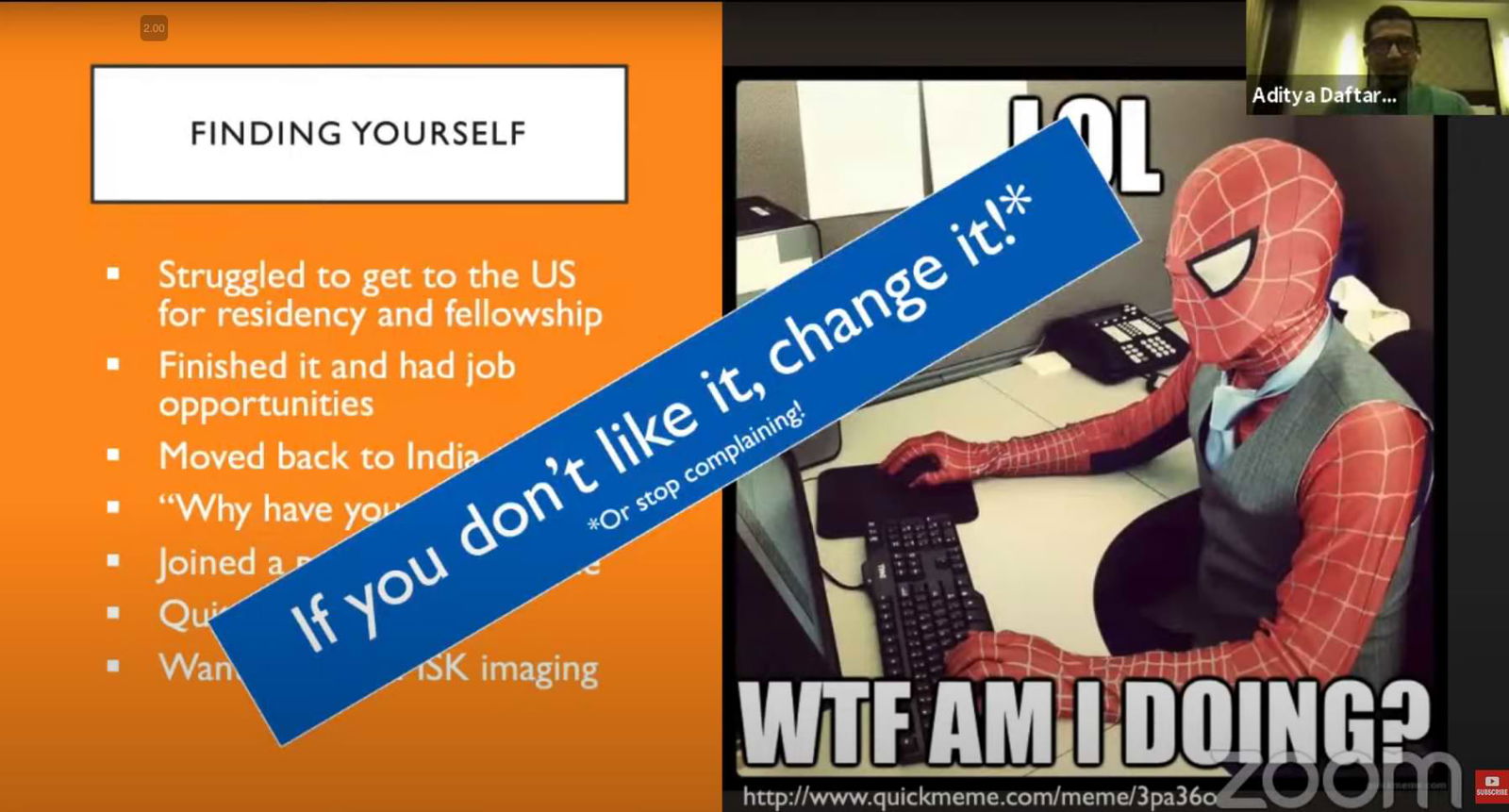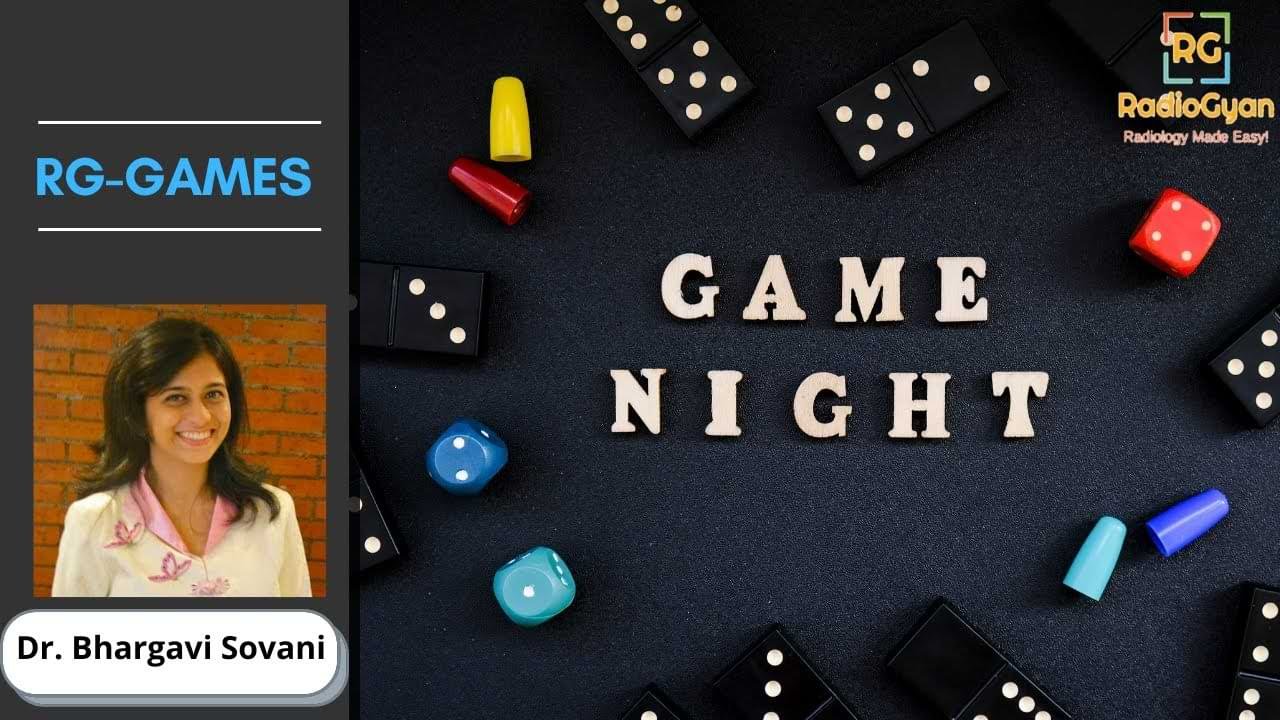Dr. Puneet Bhargava discusses success, motivation, and the importance of collaboration as a Radiologist!

Books mentioned in this talk:
- Show Your Work
- Find Your Why
- Getting Things Done
- Effortless
- Drive
- Emotional Intelligence
- Give and Take
- Essentialism
- 10x Rule
- The One Thing
- The Happiness Equation
⌚️ Time Stamps
0:00 Introduction
1:50 Overview
5:43 Show Your Work
9:23 Ask Your Friends and Family THIS question
13:45 How to Make Work More Fun?
17:25 Get Things Done (GTD)
20:30 Moving Up in Career v/s The Lattice Model
22:50 Think BIG and have BHAG
30:05 Charisma in Radiology
31:50 Givers v/s Takers and Who Wins ??
37:50 MORE Book Recommendations
38:20 (Re)Defining Success
40:20 Ideas to Explore – Summary Slide
41:25 QnA
42:09 How To Deal With FOMO and Imposter Syndrome?
46:35 Top 3 Mac OS Apps
50:30 ONE Advice for Radiology Residents
54:50 (MORE) Top Book Recommendations
56:55 Learning from Failures
1:02:05 One Recent Change That Made A Difference
Summary:
The video is a talk by Dr. Puneet Bhargava, in which he provides tips for success in a career in radiology and life. He emphasizes the importance of being passionate about one’s work, developing strong relationships with colleagues and mentors, seeking out opportunities for growth and learning, and maintaining a positive attitude. Bhargava also discusses the challenges and rewards of working in radiology and encourages individuals to pursue their interests and passions within the field. He concludes by encouraging individuals to take care of their physical and mental health to achieve success in their careers and personal lives.
Transcript:
Dr. Amar Udare: Hello and welcome to another Saturday radiology session by a team RadioGyan. My name is Dr. Amar Udare and today’s session is going to be a special session just like we’ve done before as the title suggests in these sessions what we do is we have our conversations with eminent radiologists that go beyond the darkroom. Today’s speaker again is very special Dr. Puneet Bhargava from the University of Washington, Washington Seattle and he’s going to talk about success motivation and the importance of collaboration. Doctor Bhargava is a professor of radiology at the University of Washington in Seattle he is the editor-in-chief of Current Problems and diagnostic radiology
Dr. Amar Udare: He focuses on data analytics, organizational psychology, and leadership. Clinically he is an expert in gastrointestinal and habitability radiologist. Dr. Bhargava enjoys writing teaching and collaborating and mentoring in all aspects of the publication process. Apart from all these things that he does the one thing that has got me, interested in his recent venture with YouTube. He puts out YouTube videos on productivity and how to improve yourself, leadership and those are gems so I would recommend everybody who is watching this to check out his videos later. Without any further ado, I would request Dr. Bhargava to start sharing his presentation. Over to you Dr. Bhargava.
Dr. Puneet Bhargava: Thank you and good evening to all of you guys. I’m very happy to be here and very excited and I’m going to talk about some of the topics that are very close to my heart when we talk about success motivation and collaboration there’s a lot that we doing in radiology but ultimately my observation has been that most of our success is it is driven by our ability to motivate people around us how we can collaborate better and I’m also going to talk about how over the years I have started to think about success a little bit differently.
Dr. Puneet Bhargava: So, my goals for the next hour that I’m going to spend with you and thank you Umar for bringing interest into this topic. We are going to talk about value-driven success and what that means I’ll show you. I’m going to, this talk will be littered with some of my favorite books that I’m going to recommend but I’m going to hit the highlights of those books and were going to talk about the psychology of motivation and collaboration ultimately the goal of all of this learning is to hopefully find more joy in our radiology careers.
Dr. Puneet Bhargava: So, like all of you guys, you know I started with a small dream. I was resident in India and I had this vivid or silly dream at the time that I wanted to give this presentation at RSNA, as a resident I never had a chance to go to and I wanted to meet some of the people whose books I’ve read and that was it that was my dream and I tried to make it into a vision, a vivid vision and then started on my journey.
And the other thing that I would like to tell you is that no matter at what stage you’re at, try to reinvent yourself and try to think about how you can do whatever it is that you’re doing whatever it is that you’re passionate about at a much higher level and maximize the impact you can have.
Dr. Puneet Bhargava: And that was the reason why I started this YouTube channel where I talk about non-interpretive skills, so skills that you need to succeed as a radiologist but are not thought of it in the real sense as true radiology. Things in and this background banner image are actually sort of the closest I can get to that vivid image that I had when I had that dream as a radiology resident and I feel very blessed and then I’m able to teach in various forums and fulfill my desires.
Dr. Puneet Bhargava: Now let’s talk about success for a second. Everybody wants to be successful there is nothing wrong with trying to be successful but let’s talk about the traditional model of success I think you can demystify your process, so let’s say you’re passionate about something that you wanted to do. Maybe it’s a certain job, maybe it’s a certain role. You can work backward, so what you can do is you can find those people who do those kinds of jobs or do that kind of work. Whether it’s the position or whatever it is that you want to do and ask them what their interview was like, what questions they were asked, and start Creating` stories then you would share when you’re when you would be answering that question.
Dr. Puneet Bhargava: I’m a huge believer in this idea by Austin Kleon, Show your work. So, the idea here is that you know if you look at the map of the United States of America Seattle is actually in the northwest corner of the country so if I’m doing something good in the northwest corner of America I don’t think people know about it maybe other than people in my immediate vicinity.
So if I put myself and my work out there in the open domain on the internet, the connections that I allow to happen will just blow your mind and I think this is the idea that I think that that the radiologists of the current generation need to embrace so to put our work out in an open-access format so that everybody can access work and then they will be amazing opportunities that can flow from that. So, you got to, whatever work it is that you do that you want to be successful towards you gotta put it in the open domain.
Dr. Puneet Bhargava: The next thing I want to say is that everybody needs to write. Writing may not come naturally to you but I think people get more fulfilling careers if they start writing. So, find a group of collaborators and start writing about whatever it is that you might be doing.
Now small papers are great but you want to do something really meaningful and big so that that that’ll get noticed this was one such paper that did it for me and this took about three years to pull off
Dr. Puneet Bhargava: Now if you’re trying to be successful in the traditional sense and you want to be a chairman of your department, now those roles are financial roles to a large degree. So people want to see if you’ve done a project in that space where have you made imaging more efficient, have you tried to make your hospital save more money. So whatever it is that you’re done in the finance base and I would say publish it so that there is no argument that you did the work.
Dr. Puneet Bhargava: Once you’ve done that this is your traditional model of success. You go through the ranks it’s very algorithmic you know it’s tier-based in many countries it’s age-based and I don’t like that I think it should be aptitude based but this is your traditional model of success. Probably you figured out by now that this is not the model that excites me.
Dr. Puneet Bhargava: So I’m going to reframe success for you in a different way that has brought me joy and tell some stories and hope you’ll connect with some of them and I don’t think you can truly find success and happiness until you get to know yourself better. Now how do we do that?
So I think we have to do that by finding what our values system is. Now everybody has values, and some of my biggest values are fairness and equity so when I don’t see fairness and equity in whatever I participate in I get really upset I get angry sometimes and so if I’m working towards something and there is no fairness and equity probably that’s not a good fit for me.
Dr. Puneet Bhargava: So everybody has different values but I encourage you to explore those and then ask your friends and family what were the things that made you the happiest and they would very easily tell you those things for example my wife told me recently that whenever I teach in a conference or do grand rounds or do something on YouTube, she says she has noticed that that makes me very happy so I need to do more of those things because when I’m happy and I’m passionate it rubs off on other people and so and I encourage you to explore what makes you happy.
Dr. Puneet Bhargava: Now there are some simple questions that I would ask if you were kind of on the journey and those questions would be based on the value system that you have tried to align your job so that they’re more congruent.
So, if somebody gives you a promotion is it an alignment with your values if it’s not, it might after the initial honeymoon period is over it might bring more distress, and then if you are really about service and making the world a better place. Maybe you can consider starting your own business because that is something that you can control. And then as time goes by maybe find this hybrid path of maybe doing 60 to 80 percent of radiology in the traditional sense but also carving out some time to do innovative things that bring you joy and hopefully success.
Dr. Puneet Bhargava: So basically, it’s this alignment between your skills and interest in your values that when these things are in alignment and trust me it can take many years sometimes to get this alignment is that when you’ll surely be on your success path.
Dr. Puneet Bhargava: Now if you notice the conversations in the workplace and try to give those conversations like one-word between why, how, and what you will notice that the vast majority of our time is spent on what it is that we’re gonna do, how we are gonna do, what is the protocol, when are we going to do this and what scanner.All this but we hardly spend any time talking about why and in this book is Simon Sinek’s less famous Book Find Your Why and it gives a four-hour process of defining your why.
So, I went through this exercise and I said I need to define my why for my radiology career because if I don’t know what drives me then I’m on this directionless journey
Dr. Puneet Bhargava: So, I came up with the small statement to leave radiology better than I found it. So I set a goal for myself that if I spent 30 to 35 years and radiology is not one iota better because of me when I finish my career that would be a very depressing thought, so any opportunities that I get to make radiology better, to make my colleagues better that drives me that I’m passionate about those things. So, I find time to do those things, so I encourage you to find your mission statement and design it and you know as your thoughts change you can refine it, but having a why is very important.
Dr. Puneet Bhargava: And then as time has gone by I’m sort of mid-career, I find that you know when you’re starting you know you need the money to fund your life but as you build some savings and you’ve spent a few years in radiology. I want everyone to have this mindset that, what would your life be if the paycheck didn’t matter? And that just doesn’t include your home life it should also include your work life. So how do we do that? I think that idea leads to it’s called job crafting, so basically you are crafting your job slowly over time so that you are maximizing the time that you spend in things that bring you joy and then you know kind of aligning all your values and happiness and success they’re all working together
Dr. Puneet Bhargava: So, I think there is a whole fire community out there, they’re all about you now working hard saving, some are even entrepreneurs and some have a goal of retiring early. And my goal is sort of recreational employment which means that whenever I’m practicing radiology I’m doing it for the fun of it because when I’m having fun and I’m passionate about the work that I’m doing. I know it’ll be fun for people who had come in touch with me either in my immediate vicinity or remotely like you’re doing right now because you know I’m having fun and so when you’re having fun it rubs up on people around you
Dr. Puneet Bhargava: So we all get fixated about you know how much money you’re making and what’s your salary like you know who makes more can I take more shifts but this whole idea is bogus because if you’re making a lot of money and you’re spending a lot of money your cash flow situation is bad so I think I went back and looked at my cash flow situation and this is why I encourage everybody to do. Think about how much money is left at the end of the month and learn how to invest that money and get the paycheck out of the equation.
Dr. Puneet Bhargava: Because once you start to do that you know, I think that there’s a huge amount of burnout in radiology I don’t have to educate anyone who practices radiology about how bad this is, but once you start to get money out of the equation you can start to do more job crafting and you can negotiate at work to maybe get out of these some less desirable shifts and you can have more time for your family but also get to travel and see the world, the world is an amazing place and also spend some time on your hobbies now.
I encourage all radiologists to have hobbies because whatever hobby you pursue there’s always a way to connect it back to radiology if you’re a photographer you can always connect your hobbies and make better images if you’re interested in videography like I am you can always use it for teaching so there are so many ways that you know your hobbies can make you a better radiologist even in the traditional sense.
Dr. Puneet Bhargava: Now in this Personal Finance blog in space, this blog post just blew my mind completely. This is from a blog for Mister money moustache.com and this table actually shows how quickly you can get to this place where your paycheck is out of the equation and on the left side are the savings. So if you save 60% of your money you can actually hit all your financial independence numbers in just 12 and 1/2 years. Now I’m not saying 60 is the goal but as you can see in the sliding scale the lower you are on the scale the more quickly you can get this out of your equation and then the rest of the two-thirds of your career can just be completely fun and basically you’re just focusing on finding more joy
Dr. Puneet Bhargava: I recently did grand rounds on this topic this is more of a traditional educational teaching session on how to find your financial freedom it’s kind of a summary from unit 10 plus finance books that I’ve read and I’m really passionate about this topic so I encourage you to explore this is the idea that has completely changed the course of my life
Dr. Puneet Bhargava: Now if you are a radiologist or working in the medical industry and this is going to be YouTube or working in many other Industries the revenue, we make is based on your productivity and efficiency you can’t really get away from building some efficiency skills.
So, if you are starting out, this is why I encourage you to explore this idea of getting things done I’ve made a 6 minutes something video on getting things done which I encourage you to watch. It is a very algorithmic process it’s a very simple process and once you learn it and once you actually start operating with that GTD model you realize that there are a few magical things in here.
Dr. Puneet Bhargava: I’ll give you an example, so, for example, you have a task on your plate that is less than 2 minutes, now if you put it on your calendar it probably takes you there in the same amount of time to put it on your calendar so you’re much better doing it immediately and this becomes the two-minute rule. So, once you know this about yourself start practicing it every time you are faced with a less than 2-minute item to do. Your brain just tells you, just do it just don’t think about it don’t overthink it, just don’t put it on your calendar do it now. So I’m always doing these 2 minutes tasks to keep my calendar light and then there is a whole extra algorithm to it it’s pretty easy to understand and follow
Dr. Puneet Bhargava: Start with getting things done but the goal is that if you’re not operating efficiently you haven’t developed a method and your method doesn’t have to be the GTD method all I’m saying is GTD is a good approach to start with. And then you kind of shape what your method will be going forward. You know if you haven’t started your productivity a lot of your time is going towards doing easy things that are not improving the quality of your life. Once you can figure out all the things that you’re supposed to do in your life and you do them efficiently, it opens up more time so you can do some experimentation. You can fail but hopefully with repeated failures get better moving toward mastery
Dr. Puneet Bhargava: Productivity is a separate skill set but your journey to creativity will start with a productive journey. Now some people are very creative and they’re not at all productive but most people who are working in a creative space have figured out some efficiency tips on how to get to this creative space. So, this video is also about the psychology of creativity and how to start from a productive mindset but end up where most of your time is spent in a creative space.
Dr. Puneet Bhargava: Now thinking of our careers, the initial part where I was explaining how people think the traditional model is a ladder base model. To go to the higher ranks you have to climb, the lower ranks there’s no way to get to the top unless you’ve been through the bottom and this is the traditional model.
Dr. Puneet Bhargava: This is the lattice model it means that you can go from wherever you are to wherever you want to be and just bypass all those steps in the middle. Life is too short you can’t be spending years and years on some antiquated models. Once you go from one place to another doesn’t mean you can’t come back, you can keep exploring these multiple spaces throughout your career and kind of reinventing yourself and doing you know an X percentage of maybe being a researcher and spending more time in that administrator and maybe when you’re older you don’t wanna do administration you come back and find more joy and being a full-time clinician hope that’s great and that is what careers are truly about.
Dr. Puneet Bhargava: So the other thing that I want to encourage everyone is to think about what kind of conversations you are having in the workplace about your career advancement.
So for example, if you’re hearing things like; oh you need to do more work in this space, and once you’ve created a body of work in the space we will think about advancing you. That is a very old-school way of thinking.
What you should be hearing from your mentors, your advisers, and your boss is that: We believe in you, we believe in your attitude and we believe in the skills that you bring to the table. So we’re going to empower you to do these amazing things even before you’ve done this body of work because we know that you will be successful and we will give you all the tools that you need for success. That is a very different conversation so you need to find those people who are willing to invest in you and be very perceptive to what kind of conversations are coming your way.
Dr. Puneet Bhargava: Now all of us do radiology for a living and sometimes your job may not be as fulfilling and that’s okay. There are very few people who finish their careers in the same jobs that they start. This brings me to the idea of an informational interview, informational interviewing is not physically interviewing at a new place it’s actually when you see these people at conferences. just reach out to them and say you know I’m interested to learn about your workplace. I’m interested to learn about how you do things I’ve heard about you from this person can we talk for about 20 minutes about how you guys do things with your work. You’re just collecting information so that when you’re truly at a point where you maybe want to move then you know which department would be a great fit and aligned with your values.
Dr. Puneet Bhargava: I encourage radiologists to explore side hustles. Opportunities may come your way maybe a company will reach out to you and say “Hey can you help design a certain MRI sequence”. If you’re an interventional radiologist they may come to you about creating a new device. Could be anything and think about how you can monetize that end because once you start to think as an entrepreneur you can also use the skills and the learning that you learned from your side hustle and you’ll be able to bring it back to your job in overall becomes way more fun.
Dr. Puneet Bhargava: If you’re not on social media, especially on Twitter there is a really vibrant radiology community on Twitter that’s how many of us have connected. I connect with Amar all the time on Twitter and I’ve made so many friends around the world just through Twitter. Just get there, a lot of interesting ideas and work is being shared there. It takes a few minutes in your day you don’t have to start posting if you’re not comfortable with it. Just starts slow and builds it out. It’s pretty fun.
Dr. Puneet Bhargava: I’m encouraging you to have big hairy audacious goals, so big that if you were to tell those goals to people who don’t really know you, they will burst out laughing. That’s how laughable your goals have to be that means they’re big enough and you’re pushing your limits. So just try to go to wherever you want to be and start wherever you are, it just doesn’t matter.
Dr. Puneet Bhargava: I recently read this book called Effortless and you know we are taught that if you want to be successful you’ve gotta work extremely hard and that translates to success. It is true in many instances but it doesn’t have to be and this book is full of examples of how you know billion-dollar successes happened with actually less work.
For example, if you buy on amazon.com there is a one-click buy button, and before things could be bought on the internet people had to fill out a four-page form and then they could purchase something. Amazon came up with this idea that this is all crap, why can’t we just have a button, they patented that button and had a monopoly over that button for many many years and they made several billion dollars from just simplifying the process. So, when you try to fix things don’t think complicated think simple.
Dr. Puneet Bhargava: This brings us to the idea of motivation I got interested in motivation because I noticed that if you can motivate people around you get more out of them. If your group is motivated it’s a happy group and motivation is all around us. We need to know some basics of staying motivated ourselves but also motivating our colleagues so how do we do that? so there are really three words around this, autonomy mastery, and purpose. Let Me Explain them a little bit.
Dr. Puneet Bhargava: So most people want autonomy they want the freedom to do whatever it is that they want to do, whenever they want to do it. They want the freedom to choose what they want to do and it would be amazing if we could just choose who we wanted to do our things with. So that’s the autonomy that’s very motivating. Mastery is giving people the tools so that they can be successful and Goldilocks tasks are tasks that are slightly outside your comfort zone so you have to push your limits to get a little bit better every time you do anything and then both of these things stimulate mastery. The purpose is not just money making more money is about purpose but finding something larger than yourself at a very high level may improve the quality of healthcare and may be improving outcomes that are a very laudable purpose.
Dr. Puneet Bhargava: There are extrinsic factors, whereby autonomy, mastery, and purpose are sort of in the category of intrinsic factors, these are unique to an individual, and extrinsic factors are your salary, your bonuses, and maybe some punishment like losing some of your bonus if you didn’t meet your benchmarks.
So, if there was ever a boxing match like this one between Muhammad Ali and Joe Frazier intrinsic versus extrinsic factors intrinsic factors would win by a knockout that’s how important they are.
Dr. Puneet Bhargava: So focus on the intrinsic factors and if you do not have pay equity at work which is the big thing these days and you there’s a whole other issue of women radiologists being paid less than their male counterparts.it is shocking that it still happens and it leads to extreme demotivation and so learn about the Equity theory and then take this learning from equity Theory to your workplace and explain to your leaders how just saving a few thousand dollars here and there is costing them several hundreds and thousands of dollars in Lost motivation and productivity very important to learn about that.
Dr. Puneet Bhargava: Now as you interact with different people your success is going to be guided by your emotional intelligence which is different than your IQ. IQ is how smart you are in your practice of radiology but if you are being perceived in a very bad way, if when you get stressed out you act out, and if your relationships are not working well those are things to learn in the space of emotional intelligence and that is time that is very well spent.
Dr. Puneet Bhargava: Most of what you do that will make you successful is this idea of change management, change management is a science in itself. I started reading about that several years ago and this is kind of my notes on how change management should be done in radiology. This is a good starting point it’s not a thing that is kind of set in stone but it gives your parameter about how you think about impacting change in your organization and also outside of your work pursuits.
Dr. Puneet Bhargava: Now charisma is not something that we think about intuitively most people are like all some people have and some people don’t. That’s not true if you read this book by Olivia Fox Cabane, she will teach you that charisma is something that most people learn. I’ll give you a very quick story here President Clinton was walking on White House grounds immersed in his thoughts and a person interrupted him and said President Clinton thank you for your service.
President Clinton could have just raised his hand and said thank you and keep walking on but instead what he did was fascinating he turned towards that individual gave a little bow to the waist and looked at that person in the eye and said it’s an honor serving you and then waited for a second and then walked away, that person was stunned.
Dr. Puneet Bhargava: If we look at politicians in elections they are waving and pointing to people in the crowd. They don’t know anybody in the crowd. They all go through charisma training and everybody can learn it. There are a few things that radiologists can easily learn. I got passionate about it so I brought up it with a colleague and even simple things like when you pick up the phone when somebody is asking you a question on your report.
If you are typing and talking on the phone that’s a really bad charisma so you’re much better off leaving whatever it is that you’re doing talking to someone on the phone answering the questions being in the moment with them and experiencing that they have with you will be very charismatic. You can actually do a few small things in the waiting room which will up your charisma game.
Dr. Puneet Bhargava: The world actually runs on give-and-take and this is very important to understand because there are no free gifts out there. Adam Grant made this idea really mainstream about give and take and so how this work in our lives. There are three kinds of people: givers, takers, and matches. Matcher as we all know is pretty intuitive but let’s talk about takers for a second. They’re fixated on getting more than they can give, they want everything, they don’t want to do the work, they want to take all the credit, they’re very competitive and they’re very cautious that somebody will take advantage of them. It’s really interesting and they’re very cut-throat very competitive and there is always one in every group. I’m sure by this time you’re thinking I know someone who is actually a taker so they’re not bad people they’re just wired differently
Dr. Puneet Bhargava: Who are givers? Couldn’t think of anybody other than Gandhi who was a true giver and so these people are other people focused, they will always go out of their way to help you and not expect anything in return. They are not takers in any way and they seek to enrich your lives and they are always generous. Who are these people? They are your colleagues who are trustworthy and have a strong team spirit. You would think that these people who are only givers do extremely well in life because they’re amazing people who have a great value system trying to help. That’s not true so the worst performers are actually givers but the best performers are also givers.
Dr. Puneet Bhargava: How does that happen so the way it happens is that there are two types of givers? One is the loser kind of giver and the winner kind of giver. Most of what we think about success is wrong so most of the takers actually succeed and givers commonly fail. Let’s look at these agreeability axes here. So takers at the bottom givers at the top if you’re agreeable to do whatever you are being asked that’s on the right and I disagreeable on the left.
If you are a taker and disagreeable, this is the perfect definition of mean people, a taker who is disagreeable. If you’re a giver and you’re always agreeable then you are naive and it’s only a matter of time before you get burnt out. If you are a taker and you are pretending to be a giver oh my god that’s a taker who is masquerading.
Dr. Puneet Bhargava: You don’t want to empower them with leadership positions but the place where you want to be is you’re a giver but you’re also disagreeable so when you get us to do ridiculous things you will also you will find it and you will say no because it doesn’t make any sense so these are the kind of givers that actually succeed. You just don’t want to empower the takers who are masquerading because you will get exploited but givers inspire the world so stay close to the good kind of giver.
Dr. Puneet Bhargava: This leads me to this idea of the Pareto Principle. Paretto figured out that most of our success is driven by 20% of our efforts so when that happens you realize that 80% of our time is wasted so we have to figure out what that is and just mercilessly cut that out. So with this idea if there are any German-speaking people here they would understand this phrase. Less is better, so you want to actually make your life simpler as you go on and focus on a few things but do them at a very high level and if you’re pitched an idea then you wanna get really excited about that before you say yes and if you’re not getting excited about the pitch probably you should signal.
Dr. Puneet Bhargava: When I started out my radiology career this is how I thought of success. I’m going to do good work eventually other people will see that I’m successful and when people tell me that you’re amazing, you’re successful then I will be happy. What’s wrong with this is that you know happiness has differed and that’s a bad place to start. Start with happiness first so regardless of what’s going on if you were happy, I always believe that happy people do great work. Who cares about success but guess what, now success is running after you because you are focused on doing good work? I think some of this burnout that we’re seeing here and some of the unhappiness stems from the fact that many of us are trying to find joy from work and I think I want to separate it out joy is not a great word to associate with work. You should start finding joy from family and find satisfaction from work and don’t mix the two.
Dr. Puneet Bhargava: So there’s this Japanese concept called Ikigai because there is a lot of philosophy behind you know how to find your happiness, success, and true calling. Turns out when you can actually find what you’re good at what’s actually needed what you’re passionate about what you can actually get paid for. That tiny overlap is where you want to be. It’s a hard place to get to and that’s why learning about some of these things is important because the more work you put in the closer you get to your Ikigai
Dr. Puneet Bhargava: Some more book recommendations, ‘The One Thing’ is a fantastic book and it changed how I think about things. ‘10x Rule’ will inspire you to raise your goals to a much higher level so your goal setting will be extreme goal setting. None of this actually matters if you’re an unhappy person, so try to be happy start with happy spread joy and then you’ll have a more fulfilling career. Success is complicated but success should be defined by you and success should mean differently for everyone, success was not meant to be judged by others and imposed on you that’s the wrong way to think about success
Dr. Puneet Bhargava: This idea of Memento mori it’s a stoic principle, all of us are gonna die. We have limited time on the planet so might as well do something meaningful and do something that becomes a legacy over time right?
I think this is a great way to think about your career you know as you get older as you move towards retirement, generate lots of stories that you can tell your grandkids, grandpa or grandma did this when they were young and that so much fun and this brought us so much joy that’s a great place to start. If you choose goals, goals are very interesting most of us don’t control goals so they can cause a lot of anxiety and stress because you can’t control the outcome what you can control however is the process.
Dr. Puneet Bhargava: For example, if you are trying to let say publish a paper. If you write 2 hours every day that’s your process whether the paper gets published or not that’s not something you can control so focus on the process ignore the goals, and have a goal but don’t get fixated on the goal. Double down on your process, right? Then this idea of Amor Fati again a stoic idea you shouldn’t wish too much that things shouldn’t be the way they are, rather understand that things are the way they are and then you can be happy even while you’re trying to change the status quo and that’s okay.
Dr. Puneet Bhargava: So I’ve given you lots of ideas to explore you might wanna explore some of these books there several videos online, there is a lot of content online by other people some of it is published in the radiology domain, and some of it is published in outside of radiology. But the most amazing thing is that once these ideas have percolated in your brain there’s no way you can ignore them and they will drive your success to a very large degree.
There is more that’s going to come on my channel, I am committed to producing some of this content as it percolates through life and medicine and I want to work on stuff that actually brings more joy from physicians who are sometimes struggling with challenges in healthcare. So, with that, I’ll stop I’m happy to take some questions.
Dr. Amar Udare: Thank Dr. Bhargava that was a phenomenal session. I have to watch this at least five times to absorb all the points that you shared. I think a lot of our viewers particularly liked the agreeability access that you shared that was a new concept that was really good thank you for that
I have a few questions, Dr. Ameya Kulkarni who is a very close friend of mine, one of our speakers from our team. He asked a question on behalf of early-career radiologists. He asks how can we avoid FOMO that’s fear of missing out in academia, income, and the workplace
Dr. Puneet Bhargava: So, remember I mean you’re not gonna get everything right every decision that you take is moving you towards something but also moving you away from something. The very fact that you and I both became radiologists means that we are never going to become a urologist, right? We can try as hard as we want but we are never going to be urologists so everything so you can’t have too much fear of missing out I think as Time Goes By in your life and in your career, you will find that something will bring you more joy in overtime the very same things will stop bringing you joy and it’s time to reinvent yourself
Dr. Puneet Bhargava: Once you get into this idea of financial independence and actually spend time understanding what is it that that money actually means. There’s no point in being the richest man in the graveyard right you can’t take this money with you. If this money is not bringing you joy and fulfillment what’s the point of it? I’d much rather have less money and a fulfilling life than have a life in that I really couldn’t do the things that bring me joy but I had a whole lot of money. So there is always FOMO but you have to keep reminding yourself because it’s normal psychology to want everything and you can have everything at once and that’s sort of my guiding principle
Dr. Amar Udare: Thank you, another question, relevant to early career radiologists. How do you avoid Imposter syndrome?
Dr. Puneet Bhargava: Okay so we all have imposter syndrome it’s just at a different level. When I showed up at the University of Washington. The first CT study that I read was about a patient with pancreatic cancer with a double duct sign and I didn’t know that the attending who I was reading out with was called Pat Freeney who described double duct sign. Just let it percolate through, we went through the case and he heard me out, and then at the very end he said do you know who described the double duct sign I said I had no idea and I said that would like a silly question to ask like somebody on their first day and then he said yeah that was one my papers and he walked away he was very humble about it and I had goosebumps and I and I went to the library to check like who’s he.
Dr. Puneet Bhargava: So I think it’s important to just keep it in perspective everybody starts with that. Every time you do something new you always feel like you don’t belong there. if you start writing about leadership, you’re like I am not a leader how can I write about leadership? But that’s okay you have to just get over it you know. If I make a video and I want to put it on YouTube, I’m not a movie Maker, I’m not a director, so I can have Imposter syndrome. I don’t have any business going on YouTube that’s for professional people who do video work.
There is always going to be imposter syndrome but Austin Kleon’s work is amazing if you want to get over some of these mental barriers where you think this is my job I’m doing the work anyway. I have to showcase my work in a way to maximize impact and then over to find this Imposter syndrome will die a slow death. I remember the first time when I give my first RSNA presentation.
I was like oh I probably don’t belong here but I said you know what if this is the last RSNA talk I ever gave. I will make sure that everybody in the crowd has an experience and I can live with that. We do have Imposter syndrome you have to have a method for how to deal with it, thank you.
Dr. Amar Udare: Thank you. I have prepared a few questions and if you have time, we can cover them. My first question, you mentioned that you are into productivity and you are always trying to find new apps to boost your productivity. What would be your top three MAC apps I’m sure they’ll be relevant to Windows. So, what are your top three Mac apps that you use?
Dr. Puneet Bhargava: So, I would encourage people to look into this service call set up SET app it’s for Mac it’s like a renting service for apps. it’s a subscription-based model and what they do is they have at coming in and going out. They have several good ones but some of the really really good ones that I use is a service called Back Please. It’s actually a backup system but it’s so seamless that whatever I do on my computer is backed up on the Cloud so imagine what it would do for your productivity if your Mac just died and lost everything that’s on it right so back up really important. Then there are so many apps in the setup system for example there is a thing called Alfred I don’t think it’s part of the setup but Alfred is like a search bar on steroids
Dr. Puneet Bhargava: There’s also a thing called Text Expander that you can buy. if you’re doing anything repetitive you can type those emails or anything that you do repetitively basically and give it like an acronym which they call snippets .so as an editor I am inviting people for articles all the time so I have an email that I have typed up and every time I see something worth inviting. I just say invite with the two and that’s like my micro because you would never type in the word invited with two ees whenever you type that, wherever you are on your computer that email comes up and then all you have to do is type the person’s name and the title. it saves me typing million-and-a-half characters in the last couple of years so I’m in this stuff. I mean invest in your apps and invest in your system so that you can do Mindless tasks quickly can spend more time in the creative space.
Dr. Amar Udare: Excellent! Those are nice tips, I use a couple of them and I can vouch for them. Coming to more interesting questions. What purchase of $100 or less has positively impacted your life in the past six months or recently?
Dr. Puneet Bhargava: This is one of the things that I think it’s a hidden gem there is a there is $100 or less box they come in different sizes they’re called stream deck okay now these devices are used by streamers so imagine if an online streamer is live and they have to do something that they can’t look away from the screen and spent 10 minutes doing something right so they have to have a box that they can do whatever they want to do with the click of a button right and in a way that the audience does even know that they click that button so I took that idea and I said can I take this box and reprogram it to do all the things that I want to do in my life and I have been playing with that and I have several things that I programmed on Stream Deck. If I want to open a certain file if I want open a certain program is just sitting on my box it’s a button so and it’s got a tactile feeling it’s very satisfying if I want to listen to music on my computer I can just click the Spotify button and my desired music comes out like it’s this little convenience but yeah I’ll look into Stream Deck and just reprogram it to your needs
Dr. Amar Udare: We have a lot of radiology residents who watch our channel. What advice would you give to a smart-driven radiology resident who is about to enter the real world?
Dr. Puneet Bhargava: I think in the real world you have to remember that there is training and then there’s a real world In radiology itself you’re not gonna know the answers to every case there will always be a case where you wouldn’t know what you’re looking at and it’s very important to know what you don’t know so that you can seek help and there should be no ego involved in finding another calling and saying I don’t know what this is can you help and you should be showing all these hard cases around remember it’s always about the patient it’s not about us and try to keep your ego aside when you’re reading especially with the heart cases it’s always about the patient. That’s one as far as life in radiology but not pertaining to radiology itself just know that you are successful is maybe like 10 20% is going to be driven by how smart of a radiologist you are in your not the as the majority of your success will come from these soft skills.
Dr. Puneet Bhargava: How you interact with people, how you can leverage more start of people how you can contribute to their lives, and if you go out of your way to help someone. I promise you there will always be payback it may not be immediate you may not even know that this is payback for a good deed that you did. Don’t worry about it just keep helping people as best you can go about your life and who knows you may get your dream job when you’ll be hired by one of your former residents.
In life you don’t know what happens because if you treat people badly very small community if I want to find anything about anybody or just pretty much around the globe at this point it would take a few you DMS on Twitter, a phone call, and then you can find out what they’re about. So, it’ll actually hurt you if you try to be mean and not helpful so you know just be nice be collaborative help people around you know. We don’t have to fight about our territory in the pike and always be expanded.
Dr. Amar Udare: This is gold, especially for early career radiologists this is very helpful. On a similar line, there is a lot of advice that’s not relevant that has been carried on for a long time. What is one piece of advice that you would suggest to stay away from.?
Dr. Puneet Bhargava: So, I think you will meet a lot of people who will judge you. They will say at this stage of your life you should be doing this and this. As you towards your mid-career they will say at this stage should be the chief of this or the director of that. And as a young radiologist, you should be making an X amount of money and you should not be doing look I do this. I don’t think there is a one-size-fits-all formula for each job, each department, and each university will be good at a few things and we’ll be bad at a few things.
You will always be unhappy if you always continue to focus on the bad things so what I would say is find the things that are really working well and leverage that and I always focus on that and always try to reinvent yourself like don’t think like just because now that you’ve learned radiology and you’re highly trained that that knowledge base will carry you through the 35 years that you’ll spend it really alter that knowledge base will probably last you three to five years so you have to constantly learn constantly evolve constantly maybe even rediscover yourself.
You may start off as an abdominal imager and I would be surprised if you ended your career as a breast imager that can happen too so I think this evolution and change that’s the only constant
Dr. Amar Udare: Thank you. During the talk, you had such wonderful book recommendations. I leave a link to those in the description section for those who want to check out later. Among all those books what’s one book that you have gifted the most and why?
Dr. Puneet Bhargava: So, there is the toolbox that comes to mind and begins to Philosophy so there’s a very very small book that you can read probably in 2 hours or less it’s called Obstacle is the Way by Ryan Holiday. I love that book because it makes you think about how to navigate obstacles and how to deal with them and teaches your approach to difficulties in life. The second book for career and life success and happiness is called The One Thing. Finally, there is a book called Presentations Zen which is amazing because it’s like a coffee table book you can read it in an hour or less and that will change how you do PowerPoint forever and your presentations will have an impact that you didn’t even realize. You can make presentations with just images hardly any words so my presentation was made with presentations and techniques and it that is so so valuable to learn about that technique.
Dr. Amar Udare: I’m sure we will love that book because I was about to say your presentation not only your content was good but the way you presented your slides was simple. You complimented them with what you’re talking about rather than putting everything on the slide that often a lot of speakers do so that’s one book that definitely I’m gonna check out so thank you for that.
If you have time I have a couple more questions if you are okay with us going on.
Dr. Puneet Bhargava: Yeah, of course, keep going.
Dr. Amar Udare: So, in your journey who has been your best teacher was it your mentor, was it your parents, or failure?
Dr. Puneet Bhargava: I think a little bit of everything. Your parents are never perfect always remember don’t have grudges towards them for doing the best that they can with what they have That’s a good philosophy that your parents are trying to do their best with the awareness about the time that they were living in and you know they indeed have the best for you in mind.
I think in terms of mentorship, I think the external mentors were fabulous they gave me an external perspective I always benefited from having a mentor who always called bullshit so never missed any words if something was crap, they call it out and that gave me a great perspective. Some of the pros that I learned that impacted my career you know when you go to a meeting and you’re not in a session and you’re hanging out outside the best things that I learned were in those hallway conversations. so when I go to a meeting and there is a hallway conversation that I could be part of versus going to a session and you’ll always find me in that hallway conversation because you learn amazing things there.
Dr. Puneet Bhargava: I think failure is a good teacher because it’s humbling we all feel but I think we have to reword failure there is no failure there is only learning and every single time that I have failed in my life or something bad has happened and I always think this happens what could possibly be good and that’s right it’s so bad what could possibly good can come out of this and you don’t realize at the moment but yet or six months to years on the road you’re like oh my god that was the best thing to have happened to me because if they that haven’t happened I wouldn’t have done this or that or I wouldn’t have thought this I would just be in my comfort zone and I think you have to be very uncomfortable being in a comfortable because if you’re in a comfort zone and you’re not being challenged and it and there are no challenges you’re not upset or frustrated with anything then you’re probably not growing.
Dr. Amar Udare: On those lines, as you see on social media and everywhere. Everybody talks about their successes that’s what everybody puts out. I would like to know what was your favorite failure and what lesson did you learn from that how has it impacted your life 10 years down the line or six months down the line as you mentioned?
Dr. Puneet Bhargava: I started out at the University of Washington as a faculty member with zero publications on my CV literally zero not even a case report and I was running behind and I had you know I felt like it’s only a matter of time before they find out how full of crap I am and I’ll be fired and I had no idea how to write and I started writing it in the first 2 or 3 years I had 17 rejections.
I think that’s more rejections than when people have projects in the first two or three years and I knew that English wasn’t a problem. I knew that there was something that I wasn’t doing right but, in my head, I wasn’t seeing them as rejections I was like okay this journal doesn’t want that so I have to just send it to another journal. I never for once doubted that my stuff was crap and it probably was because it was getting rejected but I was able to learn from other people and fix those things and over time like everything got accepted and a couple of years ago the road had an opportunity to become an editor of a journal and Imagine somebody starting out as in a faculty job with zero papers being an editor of the journal and having started their career with 17 rejections in the first two or three years I think that’s a classic example of a failure leading to success because I had to come two terms that my writing is not adequate.
So, I put in a lot of effort in learning the process and once you learn the process you literally become unstoppable. Because you’ve learned the ropes so it’s just a matter of walking on it.
Dr. Amar Udare: That’s an excellent example so from 17 rejections at the start of your career and now you are not only editor-in-chief of a prominent radiology journal but you’re such a prolific writer and we see your papers and top radiology journal. You mentioned that you’re constantly trying to improve. What habit in the last few years or behavior has most improved your life?
Dr. Puneet Bhargava:I try to focus on happiness and I don’t and I don’t think success is hackable I think these apps and hacks are great to do you know the things that are not really creative but then they need to be done like for example like we need to do our taxes you know we need to read our films are there lots of things in life that you can run away from and I think these productivity hacks and efficiency tips are good to do those things. I think creativity this creative process is it is a journey that is full of failure it’s a slow process it’s an iterative process but I try to be happy with whatever I am I also always remain in an uncomfortable zone but I’m always learning and you can actually learn from anyone don’t think like you need somebody senior or older to teach you.
Dr. Puneet Bhargava:I think millennials can’t eat you so much about how they approach life and how they demanding for you to know what they think is right and how forthright they are about their opinion so I don’t think we have to think about that I can only learn from older more experienced people I think one should always have like a leadership circle around them words which include people of all ages and experience and maybe some people even outside of radiology and then it should be a safe space where you can talk about your challenges and support each other I think happiness is really important and I think I think physical fitness growing up like I never prioritized physical fitness and so I’ve made it a point for my kids that there always a part of a sporting team and my wife and I were starting to prioritise exercise because that time and you know it just exercises just physical fitness has benefits for all aspects of your life for this time is very well spent and increases longevity too.
Dr. Amar Udare: Thank you, Dr. Bhargava, for patiently answering all our questions and taking this session on a Saturday morning. It was 6:30 in the morning when we started so thank you. So thank you for taking time on a weekend and sharing those pearls of wisdom from all the years of experience.
Dr. Puneet Bhargava: Thank you so much, Amar, for the opportunity. I think I’m very impressed with the community, this online education community that you and your colleagues at RadioGyan have built. I hope we’ll collaborate some more going forward but I encourage everyone to keep learning keep growing to keep engaging and I hope our lives intersect so that I get to meet you and some of the viewers when we put this behind us and we start going to meetings but feel free to reach out to me either through email or Twitter or YouTube whatever it is that you like and I will find the time to respond and I wish you all the best.
Dr. Amar Udare: Thank you, Dr. Bhargava, once again.
Once you’re done watching this video make sure you check Dr. Bhargava’s channel where he talks about productivity, life hacks, and being more successful so more similar content to what we did. Thank you, everybody, who joined us live today, and if you are watching this later on YouTube, I will leave a link to all the relevant books and talks that Dr. Bhargava discussed in the description section so you can check them out.
If you are new here make sure you subscribe to our channel, we do these videos every Saturday at 8 p.m. India time and 9:30 or 10:30 Eastern time depending on daylight savings. If you like this video comment if you have any suggestions let us know in the comments and do share it with your colleagues because as Dr. Bhargava mentioned there’s more to the pikes the more you share the more you do. Thank you, everyone and I shall see you guys in the next video bye bye thank you.
Speaker:
Dr.Puneet Bhargava
Professor of Radiology at the University of Washington in Seattle, Washington
Editor-in-chief of Current Problems in Diagnostic Radiology.
More Radiology Video content:











Great post! Remember that success is a holistic concept that encompasses both your career and personal well-being. Strive for a balance that allows you to excel professionally while enjoying a fulfilling and enriching life outside of work.
Agreed.